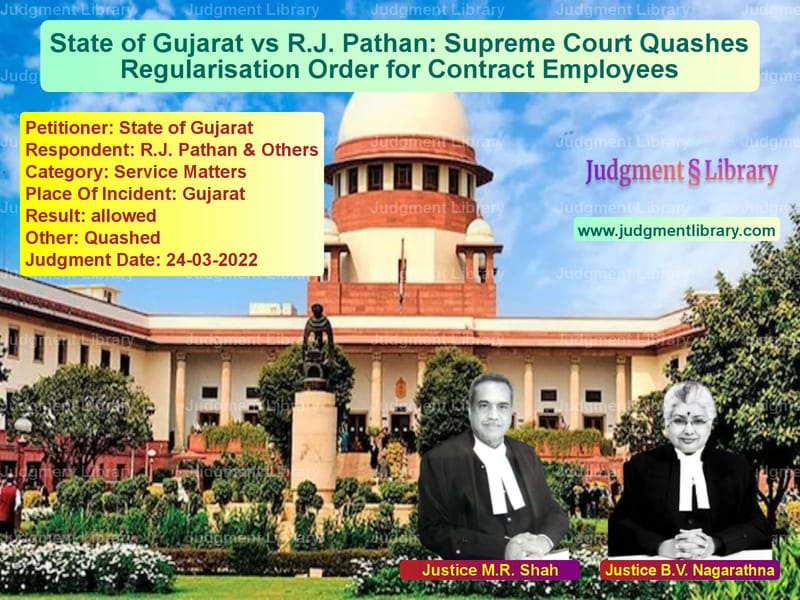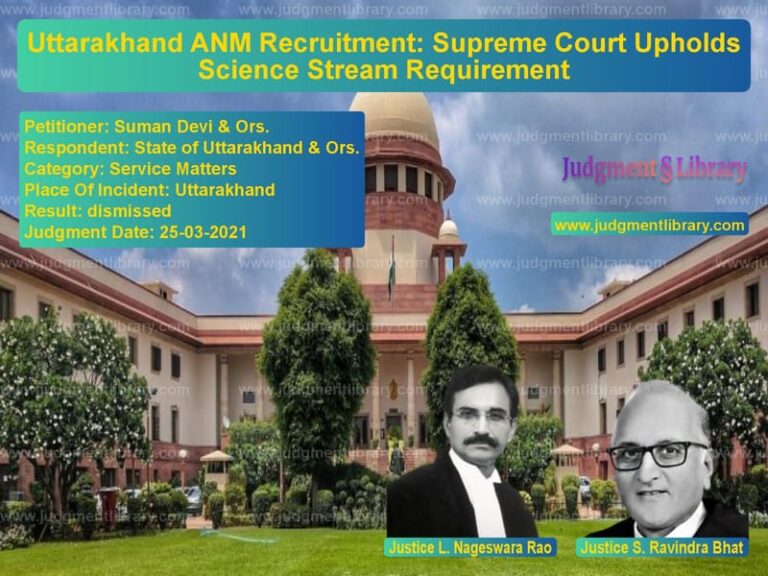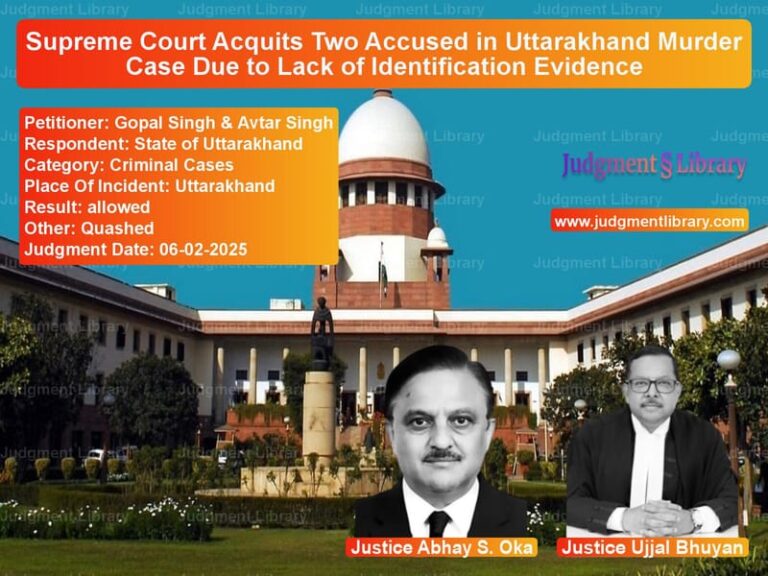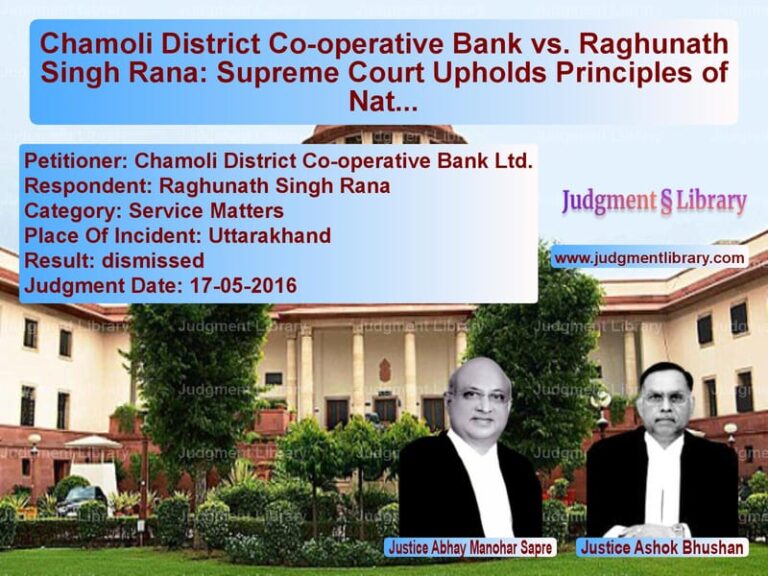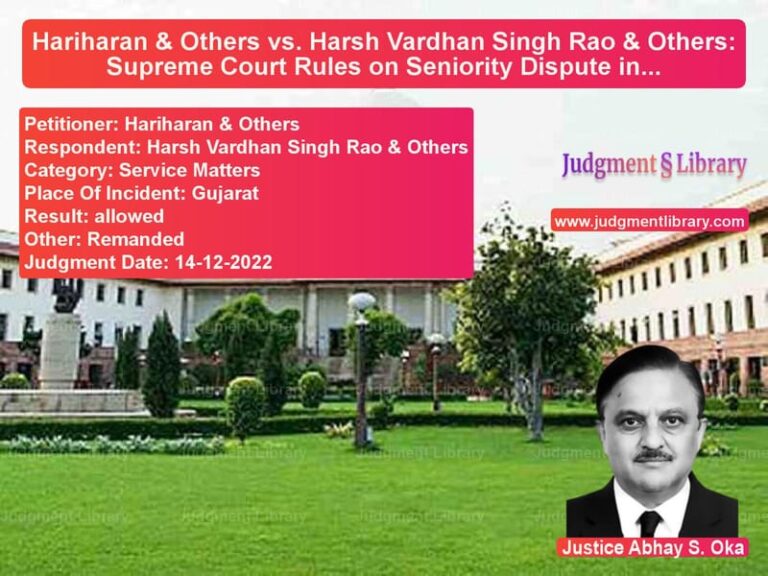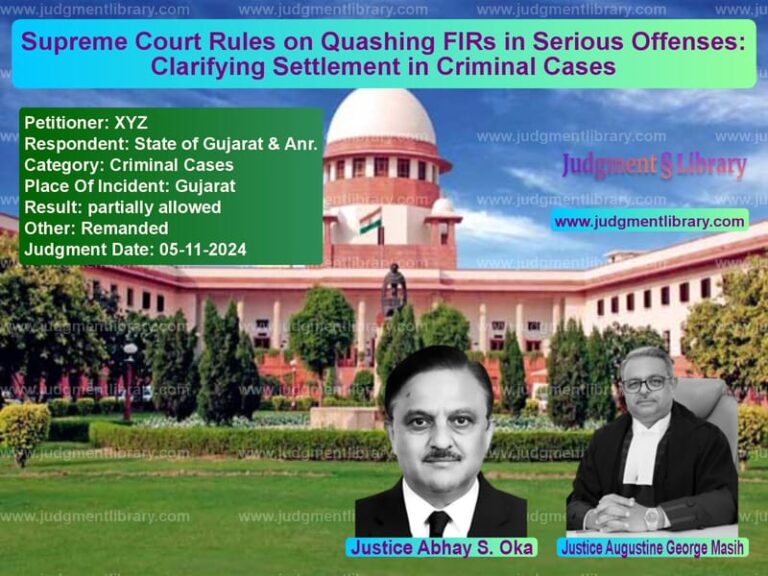State of Gujarat vs R.J. Pathan: Supreme Court Quashes Regularisation Order for Contract Employees
The Supreme Court of India, in its judgment dated March 24, 2022, ruled in favor of the State of Gujarat by quashing the Gujarat High Court’s order that directed the state to regularize the services of certain contractual employees. The case, The State of Gujarat & Others vs R.J. Pathan & Others, revolved around the question of whether contractual employees working on a temporary project could be granted regular government employment.
The appeal was filed by the State of Gujarat, challenging the High Court’s directive to consider the absorption of the respondents as permanent employees, arguing that the respondents were initially engaged on an 11-month contractual basis for a post-earthquake redevelopment program. The Supreme Court ultimately ruled in favor of the state and set aside the High Court’s decision.
Background of the Case
The respondents were originally appointed as drivers in 2004 on a temporary, contractual basis under a specific project—the Post-Earthquake Redevelopment Programme in Gujarat. Once the project ended, the state government decided to transfer them to the Indian Red Cross Society instead of terminating their services. However, the employees challenged this decision in the Gujarat High Court, seeking regularization of their services.
The Single Judge of the High Court dismissed the petition in 2011, stating that the employees were hired for a temporary period and could not claim a right to permanent absorption in government service. The employees then appealed the decision, and the Division Bench of the High Court ruled in their favor, directing the state to consider their regularization.
Petitioner’s Arguments (State of Gujarat)
The state government, represented by Ms. Deepanwita Priyanka, argued:
- The respondents were contractual employees working under a temporary project.
- They were never appointed in a regular government department or on sanctioned posts.
- Since their continued employment after 2011 was due to interim orders of the High Court, it could not be used as a justification for their regularization.
- The High Court erred in directing the creation of supernumerary posts to accommodate them.
Respondent’s Arguments (R.J. Pathan & Others)
The respondents, represented by Shri Kabir Hathi, contended:
- They had worked for 17 years under the state government and deserved to be absorbed as regular employees.
- The High Court had correctly directed the government to consider their regularization based on their long tenure.
- The case of State of Karnataka v. Umadevi (2006) 4 SCC 1 supported their claim that long-serving employees should be absorbed.
Supreme Court’s Observations
The Supreme Court, consisting of Justices M.R. Shah and B.V. Nagarathna, ruled:
“The respondents herein were appointed in a temporary project created only for the purpose of rehabilitation pursuant to the earthquake. They were not appointed in any regular establishment of the government where they had a lien. Therefore, no such direction for regularization could have been issued by the High Court.”
The Court further stated:
“The Division Bench of the High Court has also not appreciated the fact that after 2011, the respondents were continued pursuant to an interim order. Therefore, when they were continued in service due to the interim order, it cannot be a ground for their absorption.”
Key Legal Precedents Considered
The Supreme Court distinguished this case from previous judgments cited by the respondents, including:
- State of Karnataka v. Umadevi (2006) 4 SCC 1: The Court clarified that Umadevi applies to irregular appointments on sanctioned posts, not to employees appointed under temporary projects.
- Narendra Kumar Tiwari v. State of Jharkhand (2018) 8 SCC 238: This case involved irregularly appointed employees in a regular establishment, unlike the present case.
Final Verdict
The Supreme Court allowed the appeal and set aside the High Court’s order. It ruled:
“The impugned judgment and order passed by the Division Bench of the High Court is unsustainable and is accordingly quashed and set aside.”
Implications of the Judgment
This ruling reinforces that:
- Temporary contractual employees do not have a right to claim regularization in government service.
- The continuation of service due to interim orders does not grant employees a legal right to absorption.
- High Courts cannot order the creation of supernumerary posts to accommodate employees in government service.
Conclusion
The judgment in State of Gujarat vs R.J. Pathan sets a crucial precedent for cases involving contractual government employees seeking regularization. The Supreme Court’s ruling underscores the principle that temporary employment does not translate into a right to permanent government service. The decision ensures that contractual employees engaged in specific projects cannot claim tenure-based absorption into the government, thereby maintaining the sanctity of recruitment norms.
Petitioner Name: State of Gujarat.Respondent Name: R.J. Pathan & Others.Judgment By: Justice M.R. Shah, Justice B.V. Nagarathna.Place Of Incident: Gujarat.Judgment Date: 24-03-2022.
Don’t miss out on the full details! Download the complete judgment in PDF format below and gain valuable insights instantly!
Download Judgment: state-of-gujarat-vs-r.j.-pathan-&-others-supreme-court-of-india-judgment-dated-24-03-2022.pdf
Directly Download Judgment: Directly download this Judgment
See all petitions in Contractual Employment
See all petitions in Recruitment Policies
See all petitions in Termination Cases
See all petitions in Judgment by Mukeshkumar Rasikbhai Shah
See all petitions in Judgment by B.V. Nagarathna
See all petitions in allowed
See all petitions in Quashed
See all petitions in supreme court of India judgments March 2022
See all petitions in 2022 judgments
See all posts in Service Matters Category
See all allowed petitions in Service Matters Category
See all Dismissed petitions in Service Matters Category
See all partially allowed petitions in Service Matters Category

